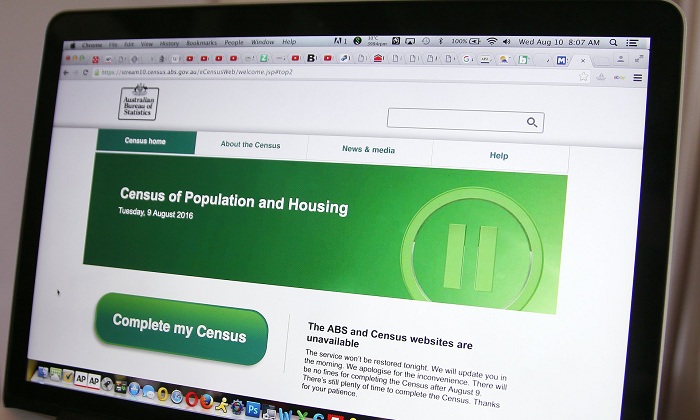Census failure like `sinking house with cracks in walls`, Senate committee finds

The Senate economics references committee report into the 2016 census, released on Thursday, found that IBM failed to check the system’s resilience and recommended open tendering be used to award the contract in future.
But it said that “the primary responsibility lies with the government” and called on “the current minister, on behalf of the government, to take responsibility”.
The review by the prime minister’s special adviser on cyber security, Alastair MacGibbon, also released on Thursday, recommended the ABS “strengthen its approach to outsourced ICT supplier performance management to ensure greater oversight and accountability”.
The 2016 census website suffered a 43-hour outage due to a denial of service attack and “systems failure” that led to a decision to take the website down.
In the immediate aftermath, prime minister Malcolm Turnbull blamed “the failure of systems put in for the [Australian Bureau of Statistics] by IBM”.
The Senate committee report noted the ABS opted for a limited tender due to time constraints, which resulted in IBM getting the contract because IBM had delivered the 2006 and 2011 census website systems.
The report found IBM relied on a strategy of blocking traffic from outside Australia to prevent denial of service attacks.
Although there was sufficient redundancy in the system to handle denial of service attacks, one of two routers was configured incorrectly and unable to be reset correctly.
In its evidence, IBM blamed its subcontractors Nextgen and Vocus for not properly implementing the “Island Australia” system, but they denied being at fault.
MacGibbon told the committee IBM’s “greatest failure” was that it did not check the system had been implemented correctly by its subcontractors. He likened it to giving blueprints for a house to a builder who “is now in dispute with a plumber and a bricklayer about what was or was not done in relation to the deficient house”.
“I cannot determine who is right and who is wrong. What I will say is that as the customer the commonwealth was not well served.”
The committee did not conclude where the relative truth lay between IBM and its subcontractors, but extended the analogy by saying “the taxpayer has bought a house off the plan with a sinking foundation and cracks in the walls”.
“They can feel rightly aggrieved,” it concluded.
There were “significant and obvious oversights in the preparation of the eCensus”, including IBM’s failure to test a router restart. The committee found the ABS’s funding “has been eroded over a number of years” and the census debacle had required the injection of $30m to fix. It expressed concern the chief statistician role was left unfilled by the ABS for most of 2014.
The report recommended the government provide funding for the 2021 census in the 2017-18 budget, and “provide sufficient” funding for the ABS to perform its work to a high standard.
“The committee recommends that the ABS take a more proactive role in validating the resilience of the eCensus application for the 2021 census,” it said.
It also said fines for not completing the census that grow by the day are “unfair” and disproportionate to the harm caused by census non-participation. Instead, “the maximum value of fines and any other penalties relating to the census [should] be explicitly stated”.
The committee noted four ministers had responsibility for the census between September 2013 and August 2016, including the current small business minister Michael McCormack. It said the government should provide “portfolio stability” for the ABS.
At the time of the census debacle, Turnbull said that “head would roll” although which heads depended on the outcome of reviews.
In August some Labor MPs called for McCormack to resign over the census. But after the release of the report a spokesman for shadow assistant treasurer, Andrew Leigh, said he would not call for McCormack, who gained responsibility for the census very shortly before, to resign.
In a statement, Leigh said the report detailed “damning evidence ... about how the ABS was underfunded to meet its objectives for the census and that current levels of funding for other ABS functions are inadequate”.
“An effective government could have delivered the 2016 Census, but the chaos and dysfunction at the heart of the Turnbull government means it mismanages everything it touches,” he said.
In a statement, McCormack said there were “lessons to be learned and that improvements are necessary” but more than 96% of households had completed their census.
“IBM has apologised to the government and the Australian public for the outage on census night,” he said. “The government has reached a commercial-in-confidence settlement with IBM on this matter.”
In comments to Guardian Australia, McCormack added that the Senate committee report was “highly partisan and political”.
“The ABS accepts responsibility for its role in the census outage, and has acknowledged and apologised for its poor judgments.”















































